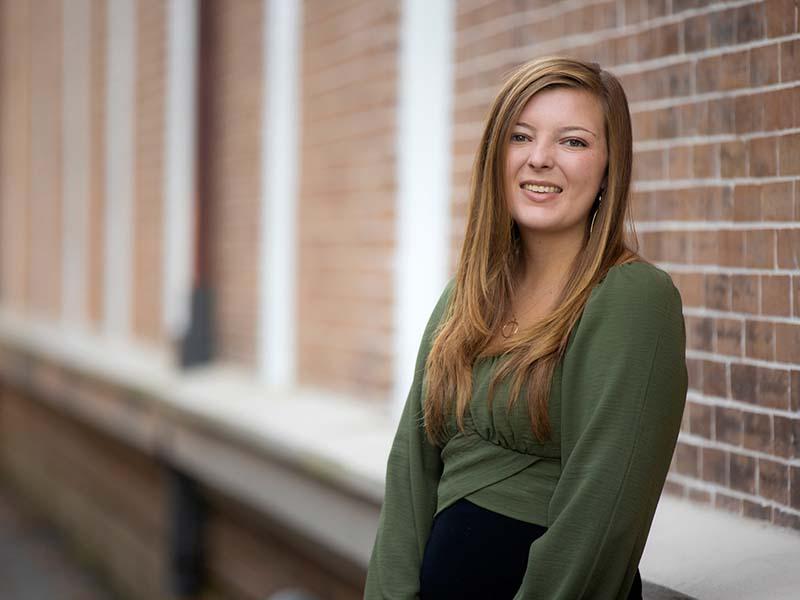Heeding the call: Tulane SoPA graduate student creates video to promote awareness of human sex trafficking
January was National Human Trafficking Prevention Month, and one Tulane University graduate student has made the prevention of this form of modern-day slavery her life’s mission.
In one of Aubry Tedford’s Homeland Security Program classes at Tulane, she read an article about the sheer number of human sex trafficking victims in the state of Alabama alone. The article was eye-opening and disturbing at the same time, and a revelation soon followed.
“Human sex trafficking is a topic I’ve always known about but really didn’t think about it because it had never happened to anyone I know,” Tedford said. “I’m from Atlanta and live in New Orleans, so that article served as a wake-up call for me. I thought this was extremely heartbreaking. The number of victims was breathtaking. I ended up writing a paper on human sex trafficking for my final class paper and became very interested in the topic, which is now something I find myself gravitating toward in many of my academic endeavors and personal life.”
The article left Tedford wanting to find out more information and do something to help make a difference. She turned to her faculty advisor, Rebecca Rouse, for help. Rouse, a professor of practice and associate program director of SoPA’s Emergency and Security Studies Program, and Tedford agreed this would be an important topic to pursue as an independent study. Rouse provided guidance as Tedford’s independent study advisor.
Following months of research, Tedford decided the best way to raise awareness of human trafficking was to make a video and a modular PowerPoint presentation and use them both as a vehicle to promote change. The multimedia offering is called The Bluebird Project: A campaign to raise awareness and end sex trafficking. The video and presentation package took six months to complete and can be tailored to different groups.
“Human sex trafficking is an insidious and pervasive worldwide threat. We believe countering these illicit activities takes a community approach, enlisting the efforts of everyone to thwart traffickers, and this is the path Aubry is taking by developing a well-researched, comprehensive and comprehensible presentation tailorable for various audiences. Her design is masterful in this way, employing content that may reach others at a visceral level while delivering a specialized education to those attending the presentation. Aubry has fully immersed herself in the conditions and challenges associated with sex trafficking and is truly developing a legitimate level of subject matter expertise,” said Rebecca Rouse.
This spring, Tedford will bring her video to the classroom. Rouse extended the opportunity to Tedford to debut her film and presentation in the new emergency and security consultancy course while also serving as a graduate assistant. Tedford will have the opportunity to assist in developing the course, including integrating her presentation and video into the curriculum and teaching other students how to deliver the content.
“I wanted to continue the project but had to find a way to deliver it to the community. Professor Rouse allowed me to start by sharing it first with my peers at Tulane University. This is a work in progress and a very sensitive subject. It’s important to be careful and share the video and project in an ethical manner. We’ll start with the classroom, working to evolve the project as we move forward,” Tedford said.
Tedford hopes the students in the class will walk away from the course with a better understanding of how to identify someone in distress, how common human sex trafficking is and that everyone has a responsibility to act if they see something that doesn’t look right.
“I would like to create a community that’s more aware of human sex trafficking and one that’s also friendly to those victims and survivors. In my mind, there’s not enough conversation about human sex trafficking in the United States. There’s not enough recognition about what is happening here. There are also a lot of myths. My goal is to get a small pocket of people to understand and eradicate it. It takes five minutes to call the National Human Trafficking hotline and report a situation,” Tedford said.
Tedford graduated from Tulane in 2021 with a triple major in political science, sociology and homeland security studies. She is now pursuing her Master of Professional Studies in homeland security. Her future aspirations are to attend law school, where she would like to study constitutional, criminal or international law, and then enter the workforce in the security sector while raising awareness about human sex trafficking.
“I would love to work on the security issues that impact women and girls. This is what drew me to human trafficking. I find this area important and very relevant right now. In the future, I hope I can continue to pursue my passion for helping victims and survivors of sex trafficking by putting my time, effort and knowledge toward eradicating trafficking, bringing the perpetrator to justice and supporting those affected by the issue,” Tedford said.
The National Human Trafficking Hotline is available 24 hours a day, seven days a week, in over 200 languages, including English and Spanish. The number to call is 1 (888) 373-7888 or text SMS: 233733 (Text "HELP" or "INFO"). Please visit the National Human Trafficking website, or the Centers for Disease Control and Prevention's Sex Trafficking page for more information.

